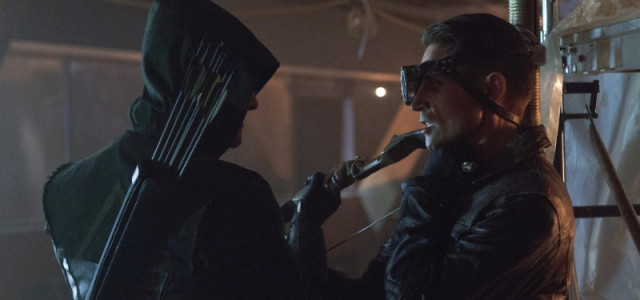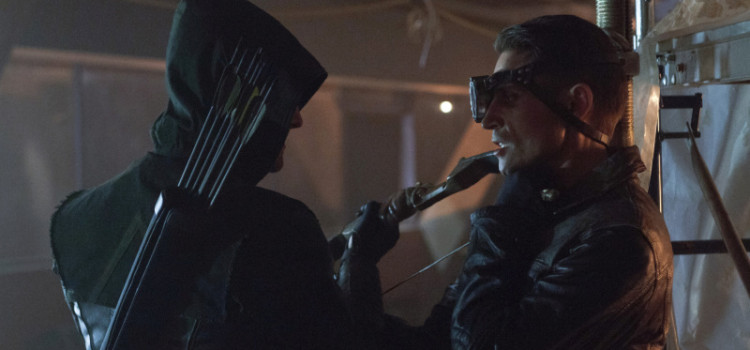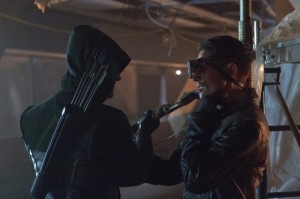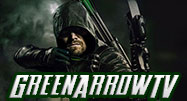

Arrow #1.3 “Lone Gunmen” Recap & Review
Recaps & Reviews October 25, 2012 Derek B. Gayle

 Summary: Arrow has been steadily improving overall in its delivery, it seems, as it gets deeper into Oliver’s family roots and relationship issues without getting too soapy. The action is still spot-on, but the actual action plot leaves something to be desired.
Summary: Arrow has been steadily improving overall in its delivery, it seems, as it gets deeper into Oliver’s family roots and relationship issues without getting too soapy. The action is still spot-on, but the actual action plot leaves something to be desired.
If you have not seen this episode yet and do not wish to be spoiled, do not continue reading!
Recap
Oliver’s quest is halted by the arrival of Deadshot, who kills one of the men on Robert Queen’s list and is clearly out for blood. Oliver deduces that Deadshot is a gun for hire for a competitor of Walter Steele—meaning he and everyone around him is in danger. After getting help from Detective Lance, Oliver manages to protect his family and take down Deadshot with an arrow to the eye. Meanwhile, Moira strives to be harder on the increasingly rebellious Thea; Laurel and Tommy’s relationship is revealed to Oliver; and Diggle finds out the truth about Oliver’s alter-ego.
For a full recap and more on the episode, visit our helpful episode guide.
Review
It’s becoming a trend for the show to have the actual vigilante plot be much less interesting than Oliver’s relationships with his friends and family. We get a clearer picture of the catalyst Oliver is for his friends; Tommy wants to be a better person, Moira a better mother, etc., and there’s some much-needed lightness from how that plays out that we don’t get from the stiff, “I have to save this city” Green Arrow stuff. Part of this is because Amell is much more engaging and charismatic when he opens up his heart and plays up his lighter, non-Arrow persona.
The way Oliver’s gone about repairing his relationships (and the impact he’s having on the people around them) have been much more memorable and engaging than the villains we’ve encountered so far. It was understandable last week, given that China White’s introduction was, well, just an introduction. This is okay for now since the show’s still developing, but sooner rather than later we’ll need to have Green Arrow fighting someone who’s interesting in the long-term and in the action sequences. And that’s what’s disappointing this week—Deadshot had potential as a long-term villain, more than just a gun for hire.
The final fight with Deadshot, for example, was surprisingly quick and without much fanfare. On one hand, it’s clever that Oliver almost seemed surprised that he took him out so quickly and effortlessly. On the other hand…why? Killing off major source material villains is okay when it serves a purpose (like killing off Green Goblin or Doc Ock in the Spider-Man films.) But here, it’s like Deadshot was pumped up solely because “he’s Deadshot!” to throw in a few nods to his comic book counterpart, only to have him written like a forgettable (and thus too gimmicky) villain of the week.
Because of this, it’s hard to really judge Michael Rowe’s performance; he’s got a certain sternness to him, and the eyepiece looked cool, but he wasn’t given too much to do. It was a promising concept to have him appear, but killing him off so quickly sort of deflated any importance the episode’s plot had. Moreover, from a story standpoint, he didn’t do much more than any unnamed villain or lackey could do. The only difference is the tattoo/wrist gun/eyepiece, but ultimately those quirks come off as superfluous and makes his place in the plot feel kind of off. It also didn’t help that the final battle was anticlimactically shot with what basically amounted to Oliver yelling from behind a wall. It’s especially perplexing considering how well-choreographed and fluid all other action sequences are.
While the Deadshot stuff left much to be desired, Arrow has been fairly adept at equally developing its supporting cast so far. It’s nice to see the Laurel/Tommy relationship stuff out in the open already, rather than dragging it out to provide drama for Oliver. It’s more realistic, and frankly, seeing how the triangle is handled after it’s revealed is just going to be more fun than trying to keep it a secret. There’s some strong writing in this scene and its development through the episode, too; it’s not pulled out for the aforementioned drama, it’s used to shine a light on the characters, as it should. Oliver’s emotional walls are in full force here, and it’s one of the few times when the stiffness works. Colin Donnell is also much stronger when playing Tommy more heartfelt than when he’s throwing out quips as the comic relief. Laurel, meanwhile, shows off her perceptiveness, being the only one to pick up on Oliver’s nigh-superhuman insight about the two of them.
And, while this isn’t explicitly related to the relationship stuff, I’d be remiss if I didn’t mention the brief-but-awesome little fight with the trio, especially Laurel. It was a nifty reference that didn’t feel like an anvil was being dropped. Though I’d normally dread having too many teases, given the show’s relentless pace so far, I wouldn’t doubt we’ll see substantial development sooner rather than later.
Admittedly, Thea’s been progressively more annoying as her little arc has gone on, but that’s probably the point. Willa Holland plays it up to the best of her ability, but portraying a whiny drunk teenager is something of a thankless role. Luckily, Thea’s actions aren’t really the focal point so much as Oliver’s and Moira’s handling of her. Both of them obviously care for Thea, and it’s the biggest example of how big their hearts are beyond their tough, seemingly emotionless exteriors.
David Ramsey as Diggle is quickly breaking out as the ensemble darkhorse of the show, and it’s easy to see why. Any straight man character who can just go with the weird things that’s happening (think Astrid in Fringe) is always fun, but Diggle’s already providing depth to that archetype. Ramsey is quite charming in the role, but there’s a clear sense of both caring and dread for his charge. Now that we’re seeing more of his backstory (and potential losses) carved out, it’s becoming clear why. The rest of the characters all have some reason to mask themselves and be very particular about what they do and say—mainly because most of these characters are prominent rich people. Diggle is probably the most down-to-Earth of all the characters, and though he’s not open about his life, he doesn’t have to work to keep up any sort of façade. Because of that, he’s able to see things that the other characters, too wrapped up in themselves and their own goals, are unable to see.
This does, however, make it a little disappointing that he didn’t completely deduce Oliver’s alter ego himself; he already seemed to be on track, and it would be fulfilling (and a learning curve for Oliver) to have someone uncover Green Arrow’s identity so quickly. Then again, Oliver’s decision to unveil the truth shows a certain amount of maturity and intelligence; he couldn’t keep running away for long, and he probably assumed Diggle would figure it out eventually anyway. Either way, it’s a welcome development.
 Hopefully now that Oliver has someone to talk to, he won’t have as much use for the pesky narration that still plagues the show. It was toned down even more this week, but anytime Amell’s voiceover reared its ugly head, it was a big reminder that the show still has some bugs to clean up. It was kind of clever to have it used in place of a recap, I guess, but Amell just doesn’t have the voice for something written so on-the-nose and heavy-handed.
Hopefully now that Oliver has someone to talk to, he won’t have as much use for the pesky narration that still plagues the show. It was toned down even more this week, but anytime Amell’s voiceover reared its ugly head, it was a big reminder that the show still has some bugs to clean up. It was kind of clever to have it used in place of a recap, I guess, but Amell just doesn’t have the voice for something written so on-the-nose and heavy-handed.
The only other complaint here is that the island flashbacks didn’t add too much to the story. The poison transition seemed a little forced; it felt like that would be a hint about something in the main story, but ultimately it was just a coincidence that Oliver was poisoned the same way on the island. We didn’t learn much of anything about the hooded man, and it didn’t particularly tie together thematically, either, and seemed more like a way to pad out the episode.
Considering the pace at which it’s moving, though, the status quo won’t stay the same for long, and it wouldn’t be surprising if kinks don’t continue to get worked out. The show already feels as if its settling into its own skin while setting up for the future (could Felicity and Diggle be the beginning of a Nikita-like team building?) The scripting also continues to be strong, as A and B plots dovetail into each other while bringing out constant character development. So in spite of the vigilante angle still being somewhat lacking, the show’s only going up from here and still has the same potential for greatness it had in episode one.
Odds & Ends
- You can find them all in the episode guide, but there are a lot of little comic book references thrown in. That Arrow is integrating these references rather than going the “Make them obvious or keep them out” approach many adaptations take is smart. It’s a nice way to keep the realism while still world-building.
- So, wait…Oliver’s in the Russian mafia?
- Oliver’s nightclub idea sounds smart on the surface, but having lots of drunken frat-mentality people partying over your base might lead to some issues.
- I really, really like Diggle’s White Knight analogy for rich guys swooping in to “save” poor communities by simply bringing their other rich friends there.
- Emily Bett Rickards was adorable as Felicity Smoak, giving off an awkward-yet-charming Felicia Day-like quality. Hope we see more of her as Oliver’s faux-tech op. And it’s very cool that Oliver is seeking help from other sources.
- The Batman-vibe was even heavier than usual this week; not only was Oliver adept at playing detective (and did a bit more detective work than Nolan’s Batman did) but there’s also a Commissioner Gordon-like relationship forming between Green Arrow and Detective Lance.
- I know this is a superhero show and there’s some suspension of disbelief with the costume changes and such. But…did he seriously apply his make-up on his way up to catch a shooter? I can buy throwing on a jacket and hood, but come on.
A SECOND OPINION
by Matt Tucker
What more can I say about this third episode than this is everything I could have hoped for from this series. While there are things I really enjoyed about the first two episodes, this is the first episode that I’ve really been engaged and thoroughly delighted by throughout. Credit goes to the premise, which seemed to solidify what the showrunners are hoping to accomplish; to the cast, who nearly all seemed to find comfort and familiarity in their roles to step up their game; and to veteran director Guy Bee, who simply knocked this one out of the park.
Utilizing DC villain Deadshot in a way much more effective than China White last week, Oliver’s mission felt much more integrated into the overall story and the stakes a lot more personal. Deadshot, in a fashion, mirrored what Oliver is trying to accomplish, though his motivations are certainly far on the other end of the scale. That not only gave same nice perspective to Oliver but to Detective Lance as well, offering a look at the positive this vigilante can be. It also provided a further view into Oliver’s experiences on the island. (A verified member of the Russian mafia?) If there’s a detriment to this episode, it’s that we really didn’t get that much of a look into Lawton as a character and man. Yet, despite the seeming fatal blow “the Hood” dealt to his foe, this was as much an origin for the familiar version of the character from the comics. One could expect to see more of him down the road, though perhaps with a more permanent version of his targeting reticle for an eye.
This third episode finds Amell settling into Oliver’s skin much better than he had previously and his sense of humor is wonderfully peeking out through the darkness. The relationship between Ollie and Diggle has quickly become the best part of the series and it’s a fitting and welcome development to see Ollie let his “bodyguard” in on his secret so quick rather than dancing around the issue.
The humor, the pacing, the action, the emotional connections between characters like Moira and Thea, and a quick glimpse at a Laurel who can kick some ass. Even the irksome narration was integral to properly telling the story. Everything was firing on all cylinders this go-round. That’s an exciting development for the young series and leaves me salivating for more.
What did you think? Talk about “Lone Gunmen” on the KSiteTV Arrow Forum!















